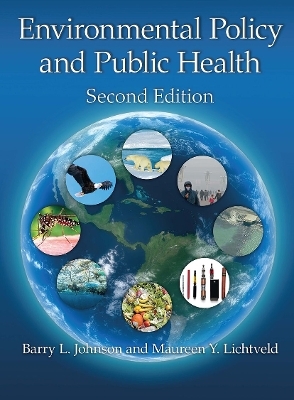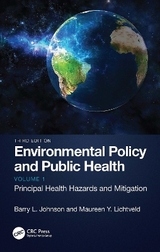
Environmental Policy and Public Health
Productivity Press (Verlag)
978-1-4987-9939-3 (ISBN)
- Titel erscheint in neuer Auflage
- Artikel merken
As with the first edition, this second edition describes how environmental health policies are developed, the statutes and other policies that have evolved to address public health concerns associated with specific environmental hazards, and the public health foundations of the policies. It lays out policies for what is considered the major environmental physical hazards to human health. Specifically, the authors describe hazards from air, water, food, hazardous substances, and wastes. To this list the authors have added the additional concerns from climate change, tobacco products, genetically-modified organisms, environment-related diseases, energy production, biodiversity and species endangerment, and the built environment. And as with the first edition, histories of policymaking for specific environmental hazards are portrayed. This edition differs from its antecedent in three significant themes. Global perspectives are added to chapters that describe specific environmental hazards, e.g., air pollution policies in China and India. Also there is the material on the consequences of environmental hazards on both human and ecosystem health. Additionally readers are provided with information about interventions that policymakers and individuals can consider in mitigating or preventing specific environmental hazards.
Barry L. Johnson, Ph.D, is adjunct professor, Rollins School of Public Health, Department of Environmental Health, Emory University, Atlanta, GA, where from 2000 to 2011 he was co-lecturer for the environmental health policy graduate course. He was editor-in-chief, International Journal of Human and Ecological Risk Assessment, from 2000̵ −2015. He received his doctorate in biomedical engineering from Iowa State University. Dr. Johnson began his public health career at the PHS air pollution program in Cincinnati, OH, conducting neurotoxicology research on criteria air pollutants. He continued this research when the U.S. Environmental Protection Agency was created, later joining the National Institute for Occupational Safety and Health as a research scientist and administrator. Dr. Johnson completed his public health career as director of the Agency for Toxic Substances and Disease Registry, an agency created by the federal Superfund law. He is an elected Fellow (Emeritus), Collegium Ramazzini. In 1999 he retired from the U.S. Public Health Service with the rank of Rear Admiral. Dr. Johnson is author of Legacy of Hope (2016), Environmental Policy and Public Health (2007), Impact of Hazardous Waste on Human Health (1999), and senior editor of Hazardous Waste: Impacts on Human and Ecological Health (1997); Hazardous Waste and Public Health )1996); National Minority Health Conference Proceedings (1992); Advances in Neurobehavioral Toxicology (1990); and Prevention of Neurotoxic Illness in Working Populations (1987). Maureen Lichtveld, MD, MPH has 35 year experience in environmental public health and currently is Professor and Chair, Department of Global Environmental Health Sciences, Tulane University, School of Public Health and Tropical Medicine. She served as one of the highest ranking CDC environmental health scientists engaged in national environmental health research, and policy, often accompanied by congressional testimonies. Her research targets environmentally-induced disease in health disparate populations. She is endowed chair in environmental policy and Associate Director, Population Sciences, Louisiana Cancer Research Consortium. As Director of the Center for Gulf Coast Environmental Health Research, Leadership, and Strategic Initiatives, her $29M research portfolio encompasses national and global environmental health including the first ever NIH (GEOHealth) award to Suriname. Since 1988, she has served as IOM consultant, is a member of US. EPA Scientific Advisory Board, the NAS IOM Roundtable on Environmental Health Sciences, Research, and Medicine, and member, Health Disparities Subcommittee, Advisory Committee to the Director CDC. She was elected Chair, Editorial Board, American Journal of Public Health and President, Hispanic Serving Health Professions Schools. Dr. Lichtveld was honored as CDC’s Environmental Health Scientist of the Year and twice named Woman of the Year by the City of New Orleans.
Section I: Policymaking Basics, Foundations, and Resources 1. Fundamentals of Environmental Health Policymaking 2. Steps in Environmental Health Policymaking 3. U.S. Federal Government’s Environmental Health Structure 4. General U.S. Federal Environmental Statutes 5. Global Environmental Health Programs and Policies Section II: Known Environmental Hazards to Public Health 6. Climate Change 7. Tobacco Products 8. Air Quality 9. Water Quality and Security 10. Food Safety and Security 11. Hazardous Chemical Substances 12. Waste Generation and Management 13. Environment-Related Infectious Diseases Section III: Emerging Areas Impacting Environmental Health 14. Energy Production and Associated Policies 15. Genetically Modified Organisms 16. Biodiversity and Endangered Species 17. The Built Environment Section IV: Influences on Environmental Health Policymaking 18. Policy Impacts of Environmental Justice 19. Policy Impacts of Risk Assessment 20. Lessons Learned and Authors’ Reflection Section V: Support Material Appendix 1: List of Abbreviations Appendix 2: List of Key Websites Appendix 3: Glossary of Key Terms
| Erscheinungsdatum | 12.11.2017 |
|---|---|
| Zusatzinfo | 58 Tables, black and white; 51 Illustrations, black and white |
| Verlagsort | Portland |
| Sprache | englisch |
| Maße | 210 x 280 mm |
| Gewicht | 1428 g |
| Themenwelt | Sachbuch/Ratgeber ► Gesundheit / Leben / Psychologie |
| Studium ► Querschnittsbereiche ► Prävention / Gesundheitsförderung | |
| Recht / Steuern ► EU / Internationales Recht | |
| Recht / Steuern ► Öffentliches Recht ► Umweltrecht | |
| Technik ► Bauwesen | |
| Technik ► Umwelttechnik / Biotechnologie | |
| ISBN-10 | 1-4987-9939-6 / 1498799396 |
| ISBN-13 | 978-1-4987-9939-3 / 9781498799393 |
| Zustand | Neuware |
| Informationen gemäß Produktsicherheitsverordnung (GPSR) | |
| Haben Sie eine Frage zum Produkt? |
aus dem Bereich



